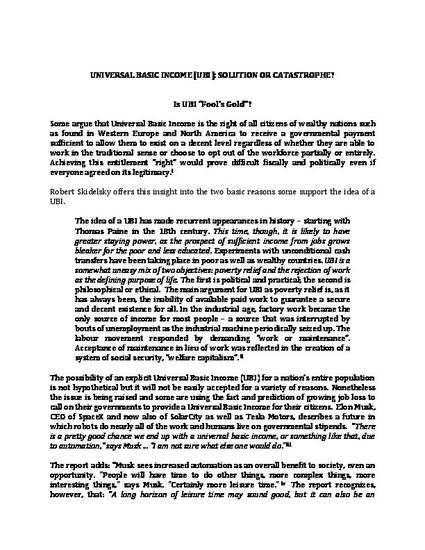
Unpublished Paper
UNIVERSAL BASIC INCOME [UBI]: SOLUTION OR CATASTROPHE?
(2017)
Abstract
"If machines are capable of doing almost any work humans can do, what will humans do?"
Moshe Vardi, Professor of Computer Science at Rice University, delivered a talk to the American Association for the Advancement of Science exploring the critical question: "If machines are capable of doing almost any work humans can do, what will humans do?" Vardi is not alone in concluding half the world’s workers will be replaced by machines within the next 30 years. If that elimination of human jobs actually occurs, it will wipe out middle-class jobs across a wide spectrum and exacerbate income and wealth inequality.
Oxford university economists Carl Frey and Michael Osborne put probable US job loss by 2030 at 47 percent. In their 2013 study of the massive impacts of computerization on human jobs, The Future of Employment: How Susceptible Are Jobs to Computerisation?, Frey and Osborne indicate that the AI/robotics technological shift is not like others we have experienced. Their fear is that unlike what has occurred in connection with other transformations of our economic system, there may not be a significant employment recovery on the other side of the downturn. Another study, Fast Forward 2030: The Future of Work and the Workplace, estimated 50% of US jobs could disappear by 2030.
In the face of serious expert analyses of the potential for large-scale and rapid job loss due to Artificial Intelligence and robotics (AI/robotics) there are increasing arguments being made that governments of wealthy nations such as found in Western Europe and North America should provide a Universal Basic Income to all their citizens. The possibility of an explicit Universal Basic Income (UBI) for a nation’s entire population is not hypothetical but will not be easily accepted for a variety of reasons and may not even be possible. The UBI concept involves payment of a stipend from a government in amounts sufficient to allow its citizens to exist on a decent level, regardless whether they are able to work in the traditional sense or choose to opt out of the workforce partially or entirely. Two basic arguments are made for the provision of a Universal Basic Income. One is that the support offered the recipients would provide security and the ability to choose a path of action aimed at an individual’s highest level of development rather than being forced into the “drudgery” of work simply to survive. The other is the assertion that a society owes support to all its members sufficient to supply their basic needs.
As a “universal” strategy UBI has side effects that will end up harming our political community. One, of course, is that once government begins paying people interest groups immediately emerge that are aggressively dedicated to their permanent and “rightful” receipt of what is immediately considered a moral entitlement. It is almost impossible to reverse such decisions. Nonetheless, faced with extremely large numbers of human jobs being permanently eliminated by AI/robotics, the idea of UBI is being discussed widely. Experimental pilot programs are underway in several US states, as well as Finland, Canada and India based on the belief that something radical has to be done as AI/robotics systems replace much of human employment. Tesla’s Elon Musk, and others such as Warren Buffett, Mark Zuckerberg, Richard Branson, Ray Kurzweil and other high tech “gurus”, describes a future in which robots do nearly all of the work and humans live on governmental stipends. “There is a pretty good chance we end up with a universal basic income, or something like that, due to automation," says Musk ... "I am not sure what else one would do.”
Even if it were financially possible to implement a comprehensive UBI program, there are significant downsides. These include mistrust, cost, and the resentment many surviving workers would feel if healthy individuals opted out of the workforce in order to “find themselves”, “have better things to do”, “I don’t like getting up before 10AM”, or “I can’t seem to find something that really excites me”. An initial test of a UBI proposal came in mid-2016 when Swiss voters overwhelmingly rejected a proposal to introduce UBI in that nation. The proposal was rejected by an 80 percent to 20 percent margin. The belief that too many people would become “free loaders” and parasites who would feed off the hard work of others played a significant role in the overwhelming defeat of the Swiss UBI proposal.
One argument in favor of UBI is moral and philosophical even while predicated on a flawed ideal of human nature. Aristotle’s concept of eudemonia assumed a supposedly natural impetus of humans to seek the highest levels of realization they were capable of achieving. This quest was best achieved without the need to be diverted by the daily grind of compensated work required for subsistence. After all, what else should we do with the gift of human life than strive to reach for the stars? The problem with this assertion is that philosophers do not live in the same world occupied by the vast proportion of the human race. The idea that all people or even most people innately seek the highest possible maximization of self unfortunately rests on a foundation of questionable assumptions about human nature, behavior and interest. My sense of whether people actually seek personal insight and some kind of ideal growth and development are more in line with Abraham Maslow, the founder of what has been called Third Force Psychology. Maslow described human behavior in terms more consistent with what I have observed than with the philosopher’s pursuit of an idealized self. He writes:
"We tend to be afraid of any knowledge that could cause us to despise ourselves or to make us feel inferior, weak, worthless, evil, shameful. We protect ourselves and our ideal image of ourselves by repression and similar defenses, which are essentially techniques by which we avoid becoming conscious of unpleasant or dangerous truths."
Denial, repression and self-deception seem considerably more accurate as descriptions of human behavior than pursuit of the Aristotelian ideal. We have found instead that rather than pursuing philosophical ideals, far too many people are addicted to the pursuit of drugs, alcohol, opioids, power and dominance, material goods, pornography, soap operas, IPhones, computer applications and games. It certainly isn’t a positive argument for UBI to read that more than one in eight people in the US are alcoholics or that we are suffering from opioid and depression epidemics. UBI is “fool’s gold”. The solution is not to sit idly by and allow AI/robotics to destroy human jobs on levels of fifty percent or more as various experts have predicted, but to implement policies that slow down the shift to an AI economy and limit the applications while dedicating ourselves to the preservation of human jobs of quality and scope. UBI represents surrender to a destructive and fundamentally disruptive set of technology, not a solution to a challenge considerably beyond those we have previously faced.
Keywords
- Artificial Intelligence,
- robots,
- robotics,
- jos,
- destruction of jobs,
- future of work,
- computerization,
- UBI. Universal Basic Income,
- UBI and free riders
Disciplines
Publication Date
2017
Citation Information
David Barnhizer. "UNIVERSAL BASIC INCOME [UBI]: SOLUTION OR CATASTROPHE?" (2017) Available at: http://works.bepress.com/david_barnhizer/125/
